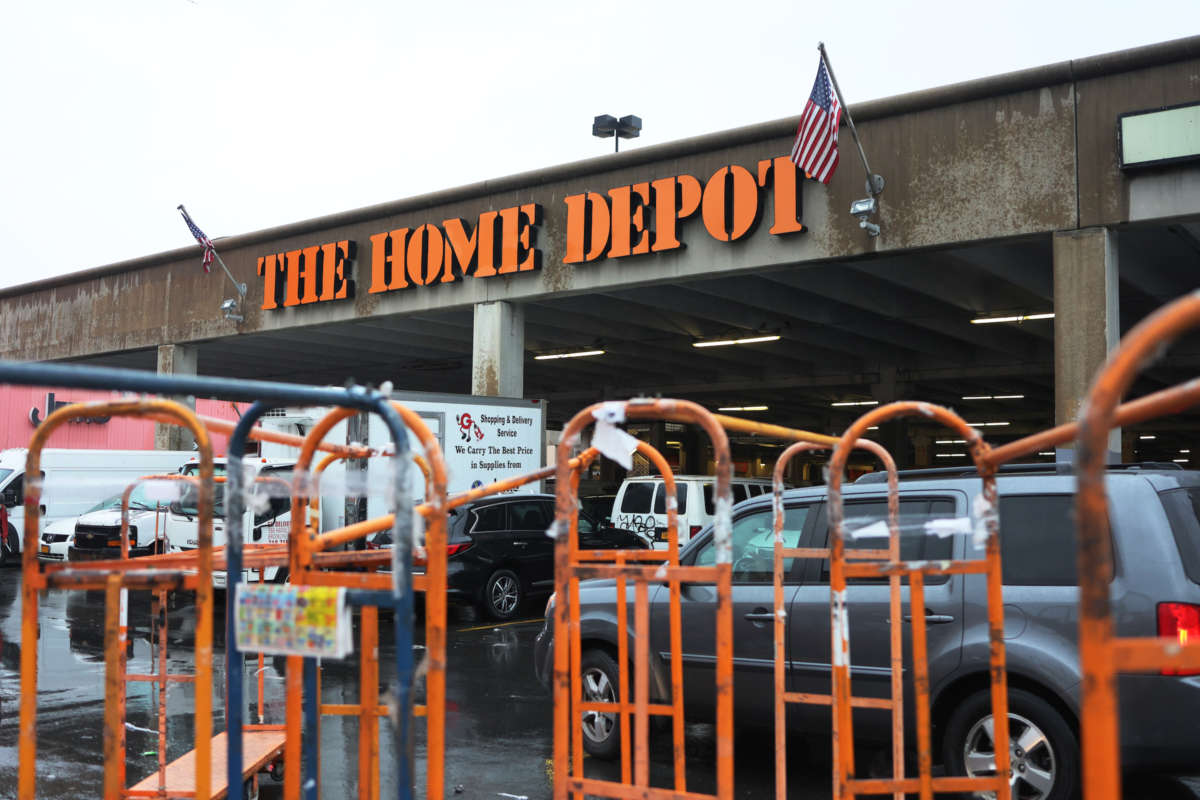Honest, paywall-free news is rare. Please support our boldly independent journalism with a donation of any size.
Retail workers at a Home Depot in Philadelphia filed a petition to unionize this week, seeking to become likely the first-ever store within the company to form a union.
The filing covers 274 employees, according to the National Labor Relations Board (NLRB), and the union is listed as “Home Depot Workers United.”
This will likely be the first-ever store-wide union within the company. The NLRB website shows only four petitions for union representation filed within Home Depot, none of which appeared to cover a large swath of employees at a single store like the Philadelphia workers’ petition. According to the International Brotherhood of Teamsters, 60 Home Depot drivers won a petition to unionize in San Diego in 2019 and were the first to ever join the Teamsters union.
The workers join a wave of retail workers at nationwide companies like Starbucks, Trader Joe’s, Apple, REI and Chipotle that have recently filed to unionize — a wave that labor activists and progressives say is a sign that the labor movement is stronger than it’s been in decades.
As the Philadelphia Inquirer reports, the Philadelphia workers are apparently unsatisfied with their pay, staffing and overall working conditions; while the company has seen soaring profits throughout the pandemic, the employees say their working conditions have deteriorated.
“Long story short, we got screwed over during the pandemic,” employee-organizer Vincent Quiles told the Inquirer. “This company made money hand over fist, and we just feel exploited. A lot of times we feel like we’re just a means to an end to make other people a lot of money.”
The company has indeed been highly profitable throughout the pandemic. Throughout 2020 and 2021, the company made tens of billions of dollars in profits, with 2021 being a “record year,” according to CEO Craig Menear. Last month, the company approved a $15 billion stock buyback plan, while Menear’s compensation for 2022 is over $13 million — or over 450 times its workers’ median pay, according to the American Federation of Labor and Congress of Industrial Organizations (AFL-CIO).
By contrast, per the Economic Policy Institute, 42 percent of Home Depot workers make less than $15 an hour, or $31,000 a year for a full-time worker. Most of its workers — 68 percent — make between $12 and $18 an hour, close to or below the city’s $17.87 living wage for a single worker with no kids, as calculated by the Massachusetts Institute of Technology’s living wage calculator.
In response to the union filing, the company says that it opposes unionization and has “a track record of working successfully with our associates to resolve concerns,” according to Bloomberg.
Quiles said that he had begun quietly organizing the store over the summer, hoping to avoid being noticed because the company “has a history of union busting.”
According to workers who joined the Teamsters in 2019, Home Depot “brought in union busters” to crush the union campaign, likely meaning that the company hired union-busting lawyers in response to the union effort as many anti-union companies do. Additionally, a TikTok posted last year supposedly shows a training video for the company with anti-union messages in it.
It’s unclear if this is an independent union, the same way Amazon Labor Union (ALU) has no affiliation with major labor unions, or if it is backed by an established union; however, Quiles says that the organizers are inspired by ALU’s effort and are “hoping to maybe do the same thing.”
A terrifying moment. We appeal for your support.
In the last weeks, we have witnessed an authoritarian assault on communities in Minnesota and across the nation.
The need for truthful, grassroots reporting is urgent at this cataclysmic historical moment. Yet, Trump-aligned billionaires and other allies have taken over many legacy media outlets — the culmination of a decades-long campaign to place control of the narrative into the hands of the political right.
We refuse to let Trump’s blatant propaganda machine go unchecked. Untethered to corporate ownership or advertisers, Truthout remains fearless in our reporting and our determination to use journalism as a tool for justice.
But we need your help just to fund our basic expenses. Over 80 percent of Truthout’s funding comes from small individual donations from our community of readers, and over a third of our total budget is supported by recurring monthly donors.
Truthout has launched a fundraiser, and we have a goal to add 231 new monthly donors in the next 48 hours. Whether you can make a small monthly donation or a larger one-time gift, Truthout only works with your support.
